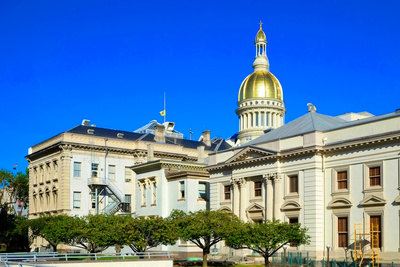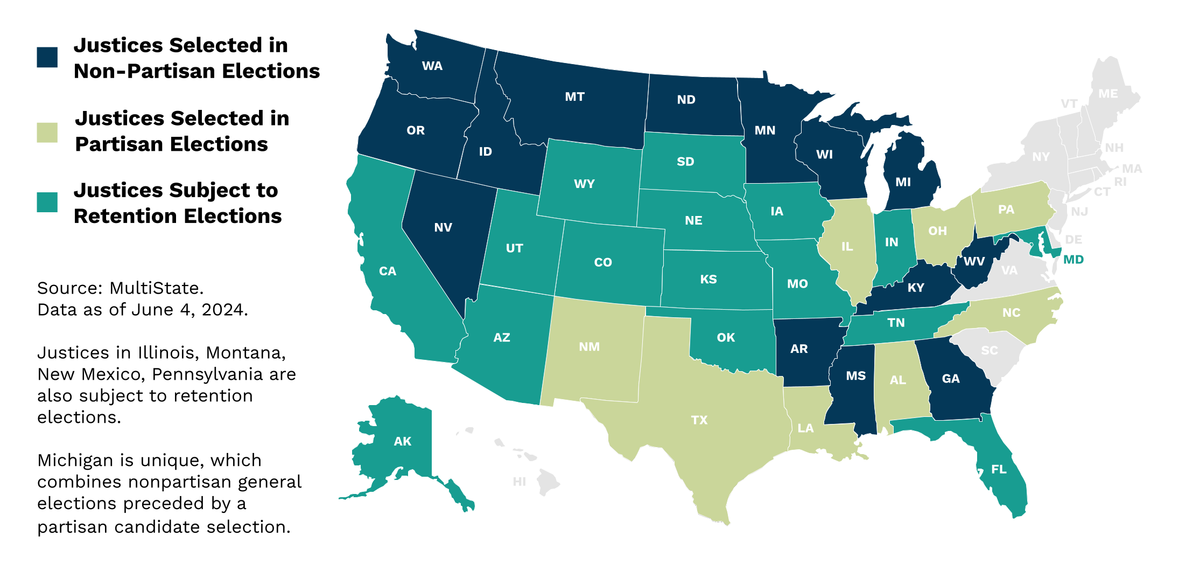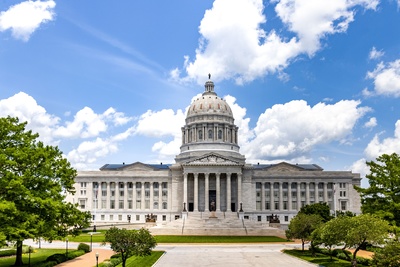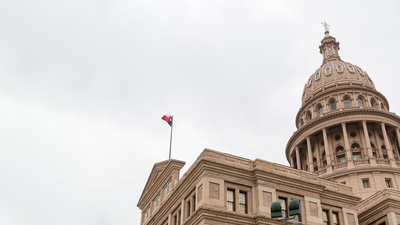
Elections & Campaigns
New Jersey and Virginia Face Key Gubernatorial Battles in 2025
September 12, 2025 | Bill Kramer
September 9, 2024 | Sandy Dornsife

Key Takeaways:
State high courts issue thousands of opinions each year, and these decisions can have major impacts on public policy. To help you keep track of consequential judicial decisions and their impact on state policy, MultiState publishes the Monthly Court Report, which offers a monthly recap of notable state high court decisions to provide a more dynamic picture of public policy trends.
While the judicial system operates on the premise that it serves as a neutral check on legislative and executive decisions, it would be naive to ignore the role ideology plays in both the composition and acts of the courts.
Making matters even more complicated, however, is that this partisan influence is not exercised equally across all jurisdictions. Supreme court justices in just four states (California, Delaware, Massachusetts, and Maine) are selected solely by the governor, while twenty-two other states have their justices appointed by the governor via a nominating commission. The remaining twenty-four select their supreme court justices via an election process.

These high-stakes elections are driven by political parties and interest groups alike, with their influence growing dramatically over the last several years. In the 2021-2022 state supreme court election cycle, state supreme court election campaigns spent $100.8 million, an almost two-fold increase from the 2017-2018 cycle.
The importance of state supreme court elections could not be more clearly represented than in the Wisconsin Supreme Court decision in Priorities USA, et al. v. Wisconsin Elections Commission. The case challenged a state supreme court ruling decided just two years prior where the Court reached a 4-3 decision that only the state legislature, which was controlled by Republicans, could regulate absentee ballot drop boxes, and not the Elections Commission. As a result, absentee ballot drop boxes were banned in all locations other than the offices of election clerks.
Fast forward to July 2024, and Wisconsin’s Supreme Court overturned the 2022 ruling, determining that election “clerks may lawfully utilize secure drop boxes” at their discretion. Like the 2022 ruling, the decision in Priorities was a 4-3 split decision, however, this time, liberals controlled the court. In April 2023, a seat on the Court was flipped, opening the door for interest groups to bring cases challenging previous decisions of the conservative court.
This year, 33 states are holding state supreme court elections to determine the occupants of a quarter of all state supreme court seats. In states, such as Michigan, Montana, Kentucky, and Ohio, where court majority margins are slim, these elections have the potential to impact major legislative policies across the issue spectrum.
The California Supreme Court delivered a win to transportation network companies (TNC) by validating a ballot measure classifying drivers in their networks as independent contractors and not employees. If the Court had invalidated the law, the TNCs would have been subject to large tax obligations, similar to Wisconsin where similar court action in March ruled that Amazon drivers are employees. Read more.
Additionally, California’s Supreme Court reversed a 2020 Public Utilities Commission order prohibiting water companies from imposing surcharges on customers when their sales are below forecasted levels. The Court established that the Commission had not given water companies proper notice regarding the rule changes; depriving them of the right to present relevant evidence for or against the change. Read more.
Finally, the California Supreme Court also chimed in on arbitration agreements, finding that an arbitration clause does not become unenforceable simply because it contains provisions that are unconscionable. Instead, the Court stated a three-pronged test should be used to determine if the unconscionable provisions can be removed or limited, independent of the rest of the agreement. Read more.
Connecticut’s Supreme Court ruled that its 2016 decision in State v. Andrew Dickson, limiting when in-court identifications of defendants are permissible, may be applied retroactively. In the case at hand, Status v. Commissioner of Correction, the defendant had offered similar arguments against the use of eyewitness testimony during his original trial. The Court held that the defendant should be allowed to make those arguments now that they are adopted by the Court. Read more.
The Connecticut Supreme Court also reached a decision impacting property owners, finding that the Connecticut Siting Council did not need to consider the impact on neighboring property values when approving the installation of a cell tower. The Court held that such consideration would only be permitted in relation to a “facility’s probable environmental impact.” Read more.
Kansas’s Supreme Court reached two landmark rulings regarding abortion rights. In the first case, the Court invalidated a state law banning the most common second trimester abortion method, and in the second case, the Court struck down increased licensing requirements for abortion providers. Both rulings were based on the Court’s determination that there is a state constitutional right to an abortion based on an individual’s right to bodily autonomy. The Court found that the laws did not satisfy the strict scrutiny necessary for infringement on such a right. Read more.
The Michigan Supreme Court overturned the guilty verdict in the case of a man who was convicted of fleeing and resisting police after he was stopped, questioned, and detained by several officers. The Court held that since the officers had no legally justifiable reason to detain the man, he was not guilty of the crimes accused. Read more.
Michigan’s Supreme Court additionally reached a decision in favor of employee rights, determining that OSHA and MIOSHA laws are not the sole source under which an employee may file a claim for unlawful employee retaliation. The Court ruled that an at-will employee may also bring a case for wrongful termination in violation of public policy which prohibits firings for “failure or refusal to violate the law” or other specified rights. Read more.
Finally, the Michigan Supreme Court continued to side with employee rights advocates in reinstating the original language of the state’s minimum wage and paid sick leave laws. Language adopting a higher minimum wage and increased leave benefits were the result of a 2018 ballot measure drive in the state, but legislators re-wrote the laws to decrease benefit changes. Michigan must now implement a new wage increase schedule, eliminate the tipped wage credit, and require many employers to provide paid time off. Read more.
Minnesota’s Supreme Court determined that a defendant who hired an independent contractor could be held liable for their negligent driving and the damages that resulted from those acts. In so doing, the Court established the new tort of negligent hiring of an independent contractor which may be proven by establishing that an entity breached its “duty to exercise reasonable care in selecting a competent and careful contractor, and that this breach of duty caused the claimant’s physical harm.” Read more.
The Minnesota Supreme Court also issued a decision regarding the proper use of self-defense. The Court held that an individual may not use a deadly weapon while they are under attack if they have the ability to reasonably retreat from the conflict. This ruling marks a stark departure from “stand your ground” policies adopted in many states throughout the country. Read more.
Nebraska’s Supreme Court upheld a controversial piece of legislation passed in 2023 banning abortions after 12 weeks and gender affirming care for minors. The law was challenged as violating the state constitutional requirement that bills are restricted to addressing one topic. The Court found that the law was not in violation since the entire bill regulated medical care. Read more.
The New Hampshire Supreme Court ruled that employers can appeal workers’ compensation coverage denials for claims of employees with second injuries. The state’s Second Injury Fund reimburses employers for payments made to employees who suffered greater injuries in a work accident due to pre-existing impairments. Read more.
New Mexico’s Supreme Court clarified parental rights for same-sex couples, determining that both individuals are legal parents, regardless of whether they are biologically related. In turn, the Court held that the determination of legal custody of children in a same-sex couple divorce should only reflect “the best interest of the child.” Read more.
The New York Court of Appeals ruled that a proposed Equal Rights Amendment did not violate any procedural requirements and may appear on the November ballot. The amendment would prohibit discrimination based on “ethnicity, national origin, age, disability, and sex - including their sexual orientation, gender identity, gender expression, pregnancy, pregnancy outcomes, reproductive health care and autonomy.” Read more.
Rhode Island’s Supreme Court held that offenders convicted of crimes before the age of 22 have a right to a parole hearing under the Youthful Offenders Act. The Act itself was enacted on behalf of one of the litigants of the case, Mario Monteiro, who, at the age of 17, was sentenced to life in prison for murder and firearm offenses. Read more.
The South Carolina Supreme Court found that giving death row inmates the choice between execution by firing squad, lethal injection, and the electric chair is not cruel and unusual since it permits the inmate to determine which method would be least painful for them. Read more.
South Dakota’s Supreme Court delivered a blow to voters and environmentalists by invalidating a voter-backed city regulation to restrict the discharge of treated wastewater into the local creek. The initiative alleged that the wastewater discharge amounted to a public nuisance; however, the Court found that such an action was permissible under state law, pre-empting the local regulation. Read more.
The Utah Supreme Court ruled that the legislature did not have the authority to rewrite a voter-approved ballot initiative prohibiting partisan gerrymandering and regulating the redistricting process. While voters approved the initiative in 2018, the legislature passed a bill in 2020 that essentially nullified the initiative’s main goals. The Court held that such an action would have to satisfy a strict scrutiny standard to be valid. The Utah legislature; however, quickly called a special session and passed a constitutional amendment to limit such initiatives. This amendment will now appear on the state’s November ballot where voters will ultimately decide its fate. Read more.
Vermont’s Supreme Court held that a school district could not be held liable for accidentally vaccinating a 6-year-old student against their parent’s wishes. The mix-up occurred after the child was inadvertently given a name tag of another student. The Court stated that under the Public Readiness and Emergency Preparedness Act, the school was immune from claims related to a covered countermeasure, which includes vaccines. Read more.

September 12, 2025 | Bill Kramer

September 11, 2025 | Sandy Dornsife

September 2, 2025 | Bill Kramer